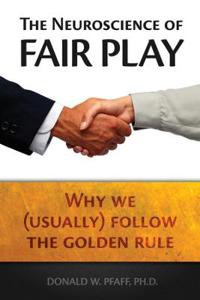Principles Of Hormone/Behavior Relations (Inbunden)
avDonald Pfaff, M.Ian Phillips, Robert T. Rubin
ISBN: 9780125531498 - UTGIVEN: 2004-10-22This text introduces underlying principles of the endocrine regulation of behavior in animals and humans. Every chapter begins by stating a principle, followed by specific examples of hormone actions derived from scientific experiments and clinical observations, and concludes with a few challenging [...]
Brain Arousal and Information Theory (Inbunden)
avDonald Pfaff
ISBN: 9780674019201 - UTGIVEN: 2005-12Arousal is fundamental to all cognition. It is intuitively obvious, absolutely necessary, but what exactly is it? In "Brain Arousal and Information Theory," Donald Pfaff presents a daring perspective on this long-standing puzzle. Pfaff argues that, beneath our mental functions and emotional disposit[...]
The Altruistic Brain (Inbunden)
avDonald W. Pfaff, Sandra (CON) Sherman, Donald W. Pfaff
ISBN: 9780199377466 - UTGIVEN: 2015-01Since the beginning of recorded history, law and religion have provided "rules" that define good behavior. When we obey such rules, we assign to some external authority the capacity to determine how we should act. Even anarchists recognize the existence of a choice as to whether or not to obey, sinc[...]
Drive: Neurobiological and Molecular Mechanisms of Sexual Motivation (Pocket)
avPh.D. Professor Donald W. Pfaff
ISBN: 9780262661478 - UTGIVEN: 1999-11-09Molecular and Biophysical Mechanisms of Arousal, Alertness and Attention (Häftad)
avEditor:Donald W. Pfaff, Editor:Brigitte Kieffer
ISBN: 9781573317030 - UTGIVEN: 2008-06-30The Neuroscience of Fair Play (Inbunden)
avDonald W. Pfaff
ISBN: 9781932594270 - UTGIVEN: 2008-01We remember the admonition of our mothers: "Treat others as you want them to treat you." But what if being nice was something we were inclined by nature to do anyway? Renowned neuroscientist Donald W. Pfaff upends our entire understanding of ethics and social contracts with an intriguing proposition[...]
Handbook of Clinical Gender Medicine (Pocket)
avKarin Schenck-Gustafsson, Paula R. DeCola, Donald W. Pfaff
ISBN: 9783805599290 - UTGIVEN: 201208Gender medicine is an important new field in health and disease. It is derived from top-quality research and encompasses the biological and social determinants that underlie the susceptibility to disease and its consequences. In the future, consideration of the role of gender will undoubtedly become[...]









